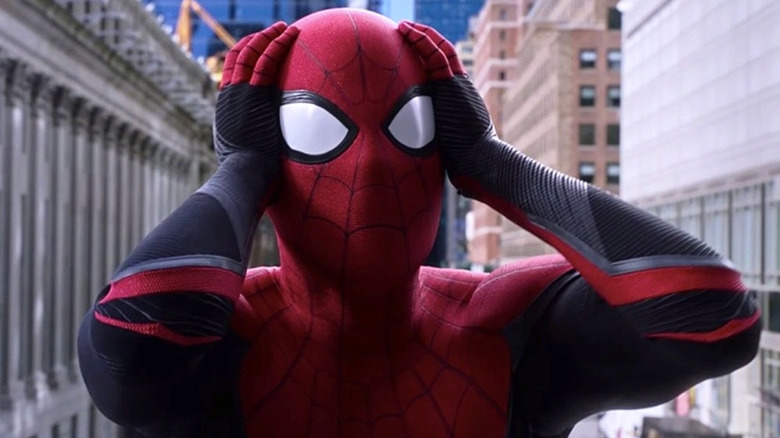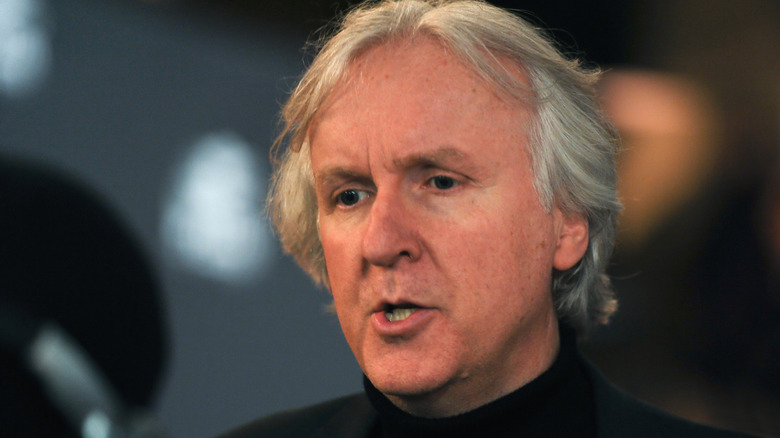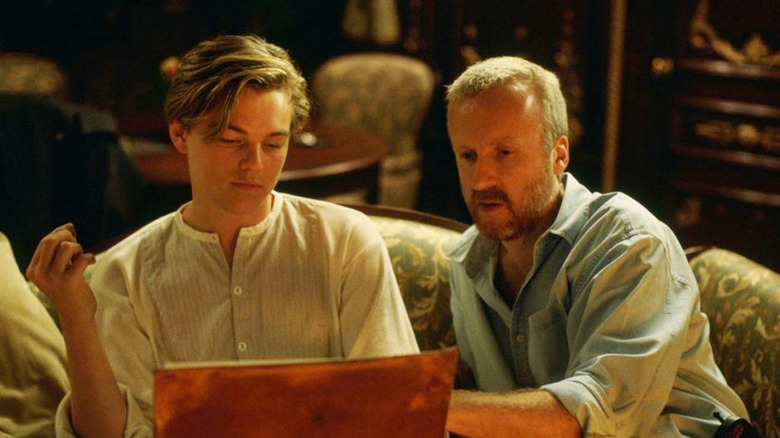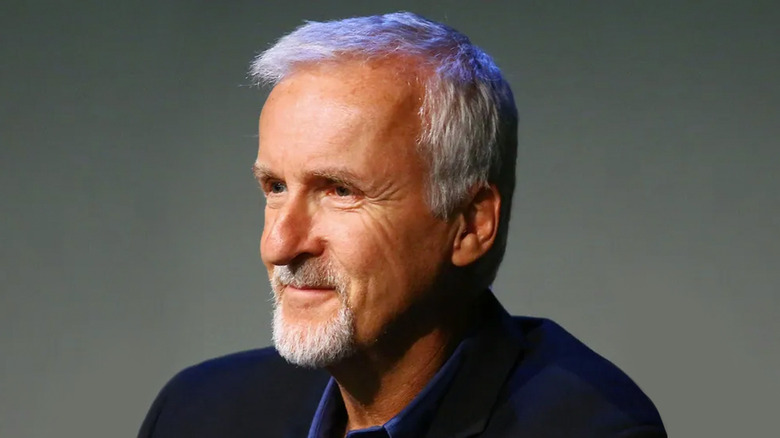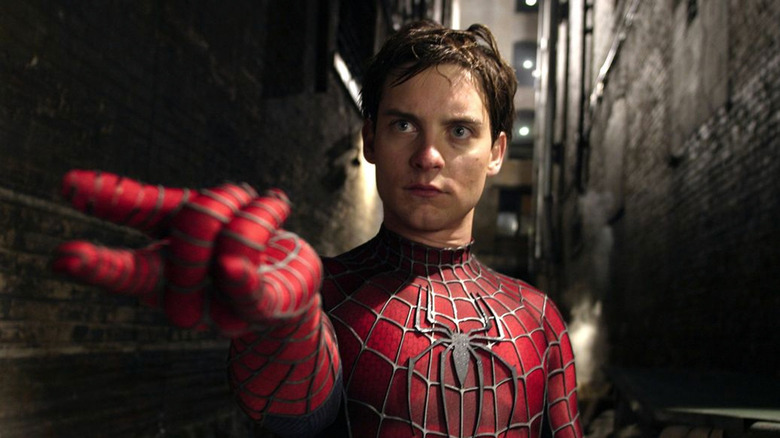What James Cameron's Spider-Man Movie Would've Looked Like
Spider-Man is easily one of the most iconic superheroes out there — and he's certainly the most revisited one. "Spider-Man: No Way Home" will be the webslinger's eighth film, and one that will culminate the efforts of the two iterations that came before current Spidey, played by Tom Holland. The hero is a cherished childhood favorite for many, including James Cameron, the director behind massive blockbusters like the "Terminator" films, "Titanic," and "Avatar."
"To me, there were all the superheroes and then there was Spider-Man," Cameron told Collider back in 2014. His reverence for the character prompted the development of his own Spider-Man movie, one that would have predated director Sam Raimi's 2002 take on Peter Parker. The director had some big changes in mind for the hero, the greatest of which might have been the film's R-rating for violence, profanity, and sexuality.
Cameron's "Spider-Man" would've been a far cry from the friendly neighborhood hero that fans have come to expect on the big screen, and though none of his scripts were officially approved, he had a pretty clear vision for the film before plans eventually fell through.
Cameron's Treatment: What Was Different?
In the '90s, Cameron was working with a now-defunct independent studio called Carolco Pictures. The production company had backed a number of hits, including "Basic Instinct," "Total Recall," and Cameron's "Terminator 2: Judgement Day" — and their lucky streak seemed to continue after landing the rights to Spider-Man in 1990. Cameron presented the studio with a "scriptment" (that is, a script and treatment combined) detailing plans for a Spider-Man movie of his own. Cameron's infamous scriptment has since made its rounds all over the web, so Spidey fans can see what exactly set his webslinger apart from all the rest.
Cameron's vision, much like that of his greatest hits, blurred the lines between PG-13 and R-ratings. His scriptment was sprinkled with colorful profanity, and even featured a love scene between Peter Parker and Mary Jane Watson. The director describes his iteration of Peter as "your basic sexually pent-up adolescent," and his transformation following his spider bite was a huge stand-in for puberty. In some instances this works brilliantly, especially in detailing Peter's coming-of-age and his newfound understanding of the complex world around him. But in others — like a certain scene where Peter wakes up covered in his own web fluid — it's a bit on the nose.
Who Did Cameron Want for the Cast?
Though Cameron's Spider-Man pitch never got off the ground, the director still had plenty of actors in mind for the cast. A young Leonardo DiCaprio was apparently a front-runner, but he only recalls having "a couple of chats" about the role. Edward Furlong, who stunned as John Connor in "Terminator 2," was also in Cameron's sights. Sitcom star Nikki Cox was a frontrunner for Mary Jane, though Robin Lively was a contender as well. For Aunt May, Cameron was apparently in talks with Katharine Hepburn and Maggie Smith. R. Lee Ermey and Michael Douglas were both candidates for the role of J. Jonah Jameson. However, two of Cameron's long-time collaborators were set to play the film's main antagonists.
Electro would have played the Big Bad in Cameron's film, though his scriptment made significant changes to the villain's origin story and his alter ego. Instead of Max Dillon, a down-on-his-luck electrician who gains his powers via lightning strike, Cameron created Carlton Strand. Strand, formerly a petty thief, gained his own "Midas touch" by wandering into a lightning field to avoid a police capture. Lance Henriksen, who'd worked with Cameron on "Aliens," "The Terminator," and "Piranha II," was in line to play the supervillain.
Cameron had also tapped Michael Biehn to play a reimagined version of Sandman. In the comics, the moniker was used to conceal the identity of Flint Marko, but in Cameron's scriptment he was known only as Boyd, a man who worked as Strand's muscle.
What Stopped Cameron's Spider-Man Project?
Fans of the current iteration of Spider-Man are all too familiar with the complicated rights involved with getting Spider-Man on the big screen. Before the ordeal between Sony and Marvel Studios, there was an all-out war for Spider-Man, and a total of seven distribution companies were involved.
In 1985, the rights passed from Marvel to Cannon Films, but the studio was forced to shelve their plans for a Spider-Man film in the face of financial loss. Cannon was purchased by another company, while Menahem Golan (a producer on Cannon's Spidey film) sold the rights three ways.
Carolco scored the rights for theatrical release, but their victory was short-lived. The studio became embroiled in a series of lawsuits with Marvel, MGM, Sony, and Viacom. 20th Century Fox also put strain on Cameron due to a pre-existing contract that they had with the director. Cameron was unable to work with another studio until the end of that contract, and since Fox refused to join the bidding for the Spider-Man rights, Cameron abandoned the project altogether, eventually helming "Titanic" with the studio.
Did Cameron Still Influence the Spider-Man FIlms?
Though Cameron was undoubtedly enthusiastic about his Spider-Man project, the film would've signaled a very different theatrical debut for one of the most beloved superheroes out there. It took big risks, making the films that came after seem tame by comparison. Cameron was never able to realize his dream of adapting his favorite hero, but some of his ideas still influenced Spider-Man in small ways.
One of Cameron's bigger changes involved Peter's webshooters. In the comics, Peter creates his own homemade web fluid, as well as a mechanism to propel it. But the director found that innovation a bit too advanced for 17-year-old Peter. Cameron's treatment saw Peter already imbued with webs that would shoot from his wrists, and director Sam Raimi borrowed that for his own trilogy of films.
"Spider-Man" screenwriter David Koepp also credits Cameron as a massive influence, not just for Raimi's trilogy, but for comic book movies on the whole. "[Cameron's treatment] took Peter seriously as a character," Koepp told IGN. "The fact that he had written this 85 or whatever it was page treatment, that in itself was really meaningful and said, no, no, take this seriously. This is a real movie with real people in it."
The more serious iteration of comic book films would spike in popularity much later, with the rise of filmmakers like Christopher Nolan and Zack Snyder. Still, it's clear that Cameron inspired that revolution, however subtly, with his unmade take on Spider-Man.
